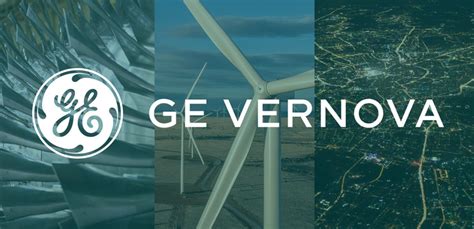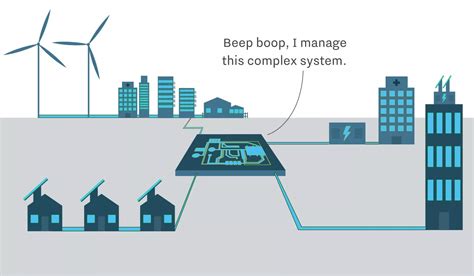As the world grapples with the challenges of climate change, energy security, and sustainability, the need for innovative solutions has never been more pressing. Decentralizing energy, in particular, has emerged as a vital strategy for reducing our reliance on centralized power plants and mitigating the environmental impacts of traditional energy production. General Electric (GE) Power Solutions, a leading provider of energy technologies, has been at the forefront of this movement, developing cutting-edge solutions that enable the efficient, reliable, and sustainable distribution of energy. In this article, we will delve into the world of decentralized energy, exploring the benefits, challenges, and opportunities presented by this paradigm shift, with a focus on GE Power Solutions' innovative approaches.
Understanding Decentralized Energy

Decentralized energy refers to the production and distribution of energy at the local level, rather than relying on centralized power plants. This approach enables individuals, communities, and businesses to generate their own energy, reducing their dependence on the grid and minimizing the environmental impacts associated with traditional energy production. Decentralized energy solutions can take many forms, including solar panels, wind turbines, and energy storage systems. By harnessing renewable energy sources and leveraging advanced technologies, decentralized energy systems can provide clean, reliable, and efficient power, while also promoting energy independence and resilience.
Benefits of Decentralized Energy
The benefits of decentralized energy are numerous and well-documented. For instance, a study by the National Renewable Energy Laboratory found that widespread adoption of decentralized energy solutions could reduce greenhouse gas emissions by up to 78% by 2050. Additionally, decentralized energy systems can provide energy access to remote or underserved communities, promote local economic development, and enhance energy security by reducing reliance on imported fuels. According to the International Energy Agency (IEA), decentralized energy solutions could also create up to 24 million new jobs globally by 2030, contributing to sustainable economic growth and development.
| Decentralized Energy Benefits | Description |
|---|---|
| Reduced Greenhouse Gas Emissions | Up to 78% reduction by 2050 (NREL study) |
| Improved Energy Access | Energy access for remote or underserved communities |
| Enhanced Energy Security | Reduced reliance on imported fuels |
| Local Economic Development | Creation of up to 24 million new jobs globally by 2030 (IEA) |

GE Power Solutions: Innovative Approaches to Decentralized Energy

GE Power Solutions has been a pioneer in the development of decentralized energy solutions, leveraging its expertise in energy technologies to create innovative products and services that enable the efficient and reliable distribution of energy. From advanced solar panels and wind turbines to energy storage systems and smart grid solutions, GE Power Solutions offers a comprehensive portfolio of decentralized energy solutions that cater to the diverse needs of individuals, communities, and businesses. For example, GE’s Predix platform, a cloud-based operating system for the Industrial Internet, enables the efficient management of decentralized energy systems, providing real-time monitoring, predictive analytics, and optimized performance.
GE Power Solutions’ Decentralized Energy Offerings
GE Power Solutions’ decentralized energy offerings include a range of innovative products and services, such as the GE Solar Panel, which boasts an efficiency rate of up to 22%, and the GE Wind Turbine, which can generate up to 5.3 megawatts of power. The company’s energy storage solutions, such as the GE Reservoir, can store up to 1.2 megawatt-hours of energy, providing a reliable and efficient means of storing excess energy generated by decentralized energy systems. Additionally, GE’s smart grid solutions, such as the GE ADMS, enable the efficient management of decentralized energy systems, providing real-time monitoring, predictive analytics, and optimized performance.
Key Points
- Decentralized energy solutions can reduce greenhouse gas emissions by up to 78% by 2050
- GE Power Solutions offers a comprehensive portfolio of decentralized energy solutions, including solar panels, wind turbines, energy storage systems, and smart grid solutions
- Decentralized energy systems can provide energy access to remote or underserved communities, promote local economic development, and enhance energy security
- GE Power Solutions' innovative approaches to decentralized energy, such as the Predix platform, enable the efficient management of decentralized energy systems
- Decentralized energy solutions can create up to 24 million new jobs globally by 2030, contributing to sustainable economic growth and development
Challenges and Opportunities in Decentralized Energy
While decentralized energy solutions offer numerous benefits, there are also challenges to be addressed. One of the primary challenges is the high upfront cost of decentralized energy systems, which can be a barrier to adoption for many individuals and communities. Additionally, decentralized energy systems often require advanced technologies and infrastructure, which can be complex and difficult to manage. However, these challenges also present opportunities for innovation and growth, as companies like GE Power Solutions develop new products and services that address these challenges and enable the widespread adoption of decentralized energy solutions.
Addressing the Challenges of Decentralized Energy
To address the challenges of decentralized energy, it is essential to develop innovative financing models, such as pay-as-you-go systems, that make decentralized energy solutions more accessible and affordable. Additionally, investing in research and development can help reduce the costs of decentralized energy systems and improve their efficiency and reliability. Governments and regulatory bodies can also play a crucial role in promoting decentralized energy by creating favorable policies and incentives that encourage the adoption of decentralized energy solutions. For instance, the US Department of Energy’s Solar Energy Technologies Office has established a goal of reducing the cost of solar energy by 50% by 2030, which could help make decentralized energy solutions more competitive with traditional energy sources.
What is decentralized energy, and how does it work?
+Decentralized energy refers to the production and distribution of energy at the local level, rather than relying on centralized power plants. Decentralized energy systems can take many forms, including solar panels, wind turbines, and energy storage systems, which enable individuals, communities, and businesses to generate their own energy and reduce their dependence on the grid.
What are the benefits of decentralized energy, and how can it contribute to a sustainable energy future?
+The benefits of decentralized energy are numerous and well-documented. Decentralized energy solutions can reduce greenhouse gas emissions, provide energy access to remote or underserved communities, promote local economic development, and enhance energy security. By leveraging innovative technologies and promoting energy independence, decentralized energy can contribute to a sustainable energy future and help mitigate the impacts of climate change.
How can GE Power Solutions' innovative approaches to decentralized energy enable the efficient and reliable distribution of energy?
+GE Power Solutions' innovative approaches to decentralized energy, such as the Predix platform, enable the efficient management of decentralized energy systems, providing real-time monitoring, predictive analytics, and optimized performance. Additionally, GE's comprehensive portfolio of decentralized energy solutions, including solar panels, wind turbines, energy storage systems, and smart grid solutions, can help individuals, communities, and businesses generate their own energy and reduce their dependence on the grid.
In conclusion, decentralizing energy with GE Power Solutions is a vital strategy for reducing our reliance on centralized power plants and mitigating the environmental impacts of traditional energy production. By leveraging innovative technologies and promoting energy independence, we can create a more resilient, efficient, and equitable energy system for all. As we move forward in this new era of energy production and distribution, it is essential to address the challenges of decentralized energy and promote the widespread adoption of decentralized energy solutions. With the right technologies, policies, and incentives in place, we can unlock the full potential of decentralized energy and create a sustainable energy future for generations to come.



